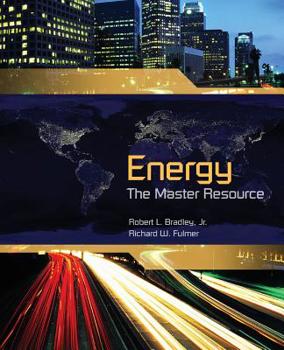Energy: The Master Resource
Select Format
Select Condition 
Book Overview
The best single primer on energy also happens to be written by an Austrian economist--a Rothbardian even! Author Robert Bradley, together with Richard Fulmer, have put together an outstanding book... This description may be from another edition of this product.
Format:Paperback
Language:English
ISBN:0757511694
ISBN13:9780757511691
Release Date:July 2004
Publisher:Kendall/Hunt Publishing Company
Length:252 Pages
Weight:1.15 lbs.
Dimensions:0.5" x 7.2" x 9.0"
Customer Reviews
4 ratings
New Book Provides Excellent Education About Energy Production
Published by Thriftbooks.com User , 14 years ago
Energy: the Master Resource is a truly valuable introduction to the history, technology, economics, and public policy of energy. It should and could be taught as a science elective in every high school and college. The science and technology are easily understood and are supported by brilliantly colored graphics. The politics and economics are carefully explained. There are reasons to appreciate our past production of energy and to be optimistic about our energy future. As this book documents, carbon-related technologies are doing well in a two-front war against resource depletion and pollution. Economists believe the fossil fuel resource base will be adequate for many decades and probably centuries. Technological improvements and capital turnover (that is, replacement of older vehicles, machines, and power plants with newer, more efficient equipment) promise to continue to make our air and water cleaner in the decades ahead even as energy consumption increases. Far too much reporting on energy and environmental issues is simplistic, agenda-driven, and alarmist. Without historical context and without an appreciation for basic economic principles such as opportunity cost, cost/benefit analysis, and decision-making in the face of uncertainty, problems can be seen where none exist, and solutions can create real problems where none existed before. This book can help balance the debate in the classroom, the office, and the home. Competing Power Sources The first chapter of the book, on "basics," succinctly explains the underlying physics of energy production. Work, power, quads, BTUs, and kinetic and potential energy are all clearly explained. Power production, whether steam, coal, or nuclear, is actually quite simple, and the authors make no effort to complicate it. Their writing style is so uncomplicated that you quickly forget you are reading a science text. A few samples of comments on nuclear energy, oil, wind power, and solar energy will illustrate my point. "In the United States," the authors write, "the amount of electricity produced by nuclear plants has increased by 25 percent during the 1990s even though the number of nuclear plants fell by eight, from 112 to 104, during the same period. This was made possible by raising the average capacity utilization factor of the remaining plants to 89 percent from 69 percent. Put another way, the amount of time that the units were running versus their theoretical maximum rose by one-third." "While 39 percent of America's overall energy came from oil in 2002," they note, "less than 3 percent of the country's electricity was generated from oil-fired plants. Oil resources are less plentiful and generally more expensive than coal but oil has a lower environmental impact. It burns more completely than coal and leaves no ash to be hauled away. It also produces fewer emissions per unit of energy generated." "Assuming that the wind blew all the time," they write, "it would take twenty five hundred 4
A Peaceful Eye in a Political Hurricane...
Published by Thriftbooks.com User , 15 years ago
...and just as clear. This is a readable, helpful, engaging, and valuable book. Straight information on energy: what it is, where it comes from, the pros and cons of its productions, the real problems we face and, more importantly, the problems we don't need to face. If you're simply concerned about the future of abundant energy, but haven't really looked objectively into the matter, this book will either scare you straight or give you the objective ammo you've only felt was there. The darkest cloud on the horizon is not a lack of energy, but a stupid approach to the matter. The book is very pro-free market. It makes the case that freedom is essential to economy and ingenuity, that free markets are the way, not the obstacle, to energy sufficiency, and that government activism so often worsens the problems it tries to solve. Ignoring the natural economic behaviors of human beings is like throwing a map away when you still need it. One thing I can take away from the current environmental hysteria: my discovery that a lot of individuals are rediscovering the mechanisms of the free markets and the ways of liberty. That includes me. So if you think the solution to the problem lies with government, I urge you to read this book with an open mind and with the question, "How can we secure abundant energy economically". Please forego the politics. All politics does is anger people and leave them feeling helpless. There's much more satisfaction in getting a little accuracy than in always having to be right. And clarity like "Energy: The Master Resource" is not only settling; it opens the door to optimism, and thus to success. As the authors state, "Pessimism is a grim master; it carries with it the seeds of failure."
Above average introduction to energy-related business.
Published by Thriftbooks.com User , 18 years ago
While there's nothing here that can't be found elsewhere, this is an above average introduction to energy-related business issues. Rather than having to search various resources, Bradley compiles them into a single, thin, easily read volume.
Excellent Source
Published by Thriftbooks.com User , 19 years ago
This book is an excellent source of information about energy as well as the development of energy resources. The book contains a great body of statistical and other information, often not readily available from other sources. Moreover the colorful charts are excellent. The reader expecting detailed explanations of energy technology will be disappointed. But as a general energy history and overview this work is unsurpassed.




